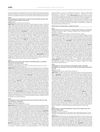Comment on 'Androgens and Women: COVID-19 Outcomes in Women with Acne Vulgaris, Polycystic Ovarian Syndrome, and Hirsutism'
April 2021
in “
International Journal of Dermatology
”

TLDR Women with conditions like PCOS may have a higher risk of COVID-19, but treatments like isotretinoin could help those with acne.
The correspondence comments on a study by Yale et al. that investigated the relationship between hyperandrogenic conditions in women, such as polycystic ovary syndrome (PCOS), nodulocystic acne, or hirsutism, and COVID-19 outcomes. Yale et al. found that hospitalization rates for COVID-19-positive women with these conditions ranged from 4.5 to 8%, with no significant increase in mortality compared to those without these conditions, and no significant associations with therapeutics like spironolactone, estradiol, and metformin. However, other studies have indicated that women with PCOS may have a 28% increased risk of suspected/confirmed COVID-19 compared to non-PCOS women and that isotretinoin, which can decrease serum androgen levels and downregulate ACE2 receptors, may be beneficial for PCOS patients with acne. The correspondence suggests that PCOS may represent a distinct subgroup of women at higher risk of adverse COVID-19-related outcomes and that low-dose isotretinoin could be considered for women with cutaneous manifestations of hyperandrogenism during the COVID-19 era, although it is not a prevention or treatment for severe COVID-19.





